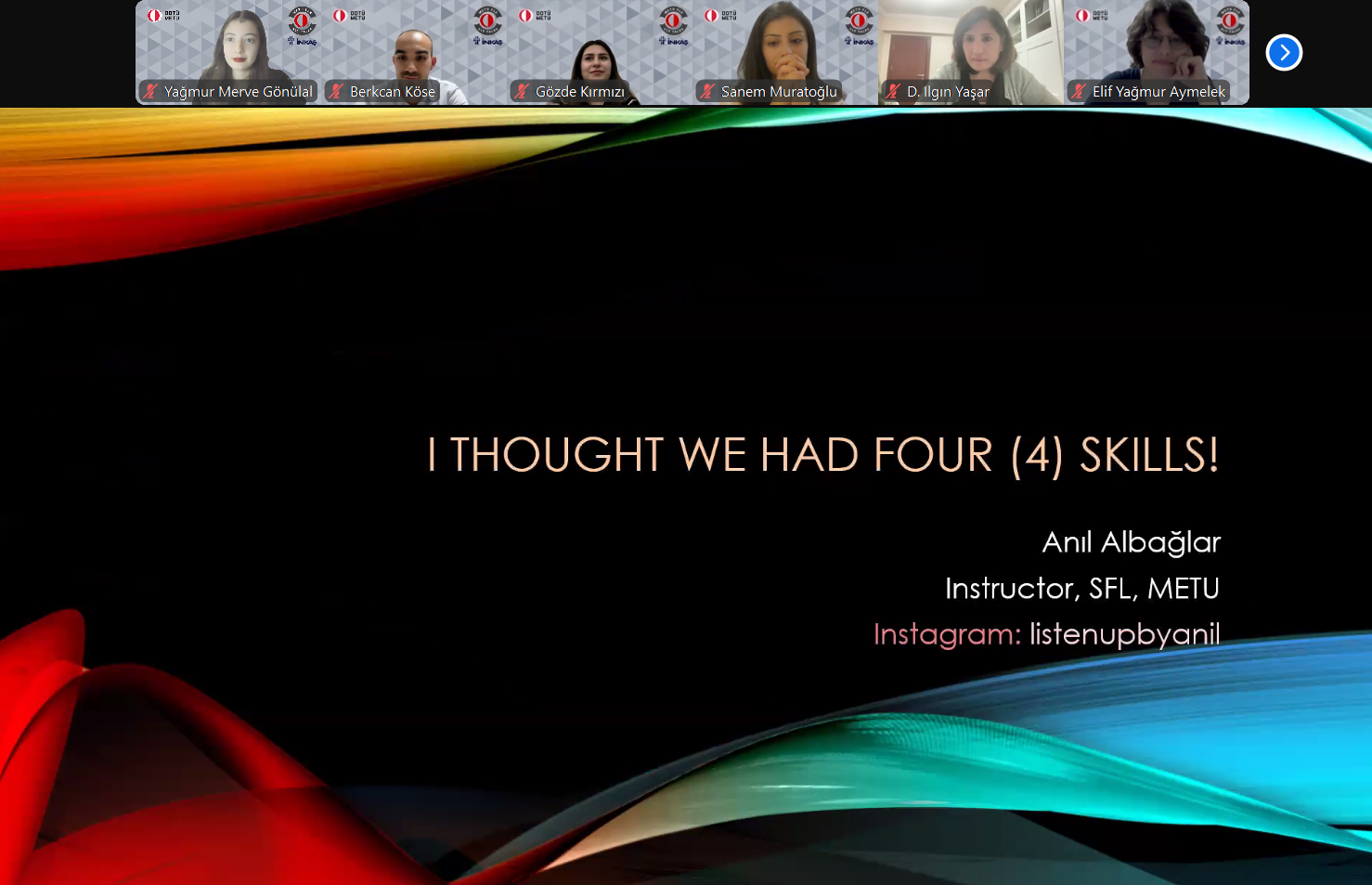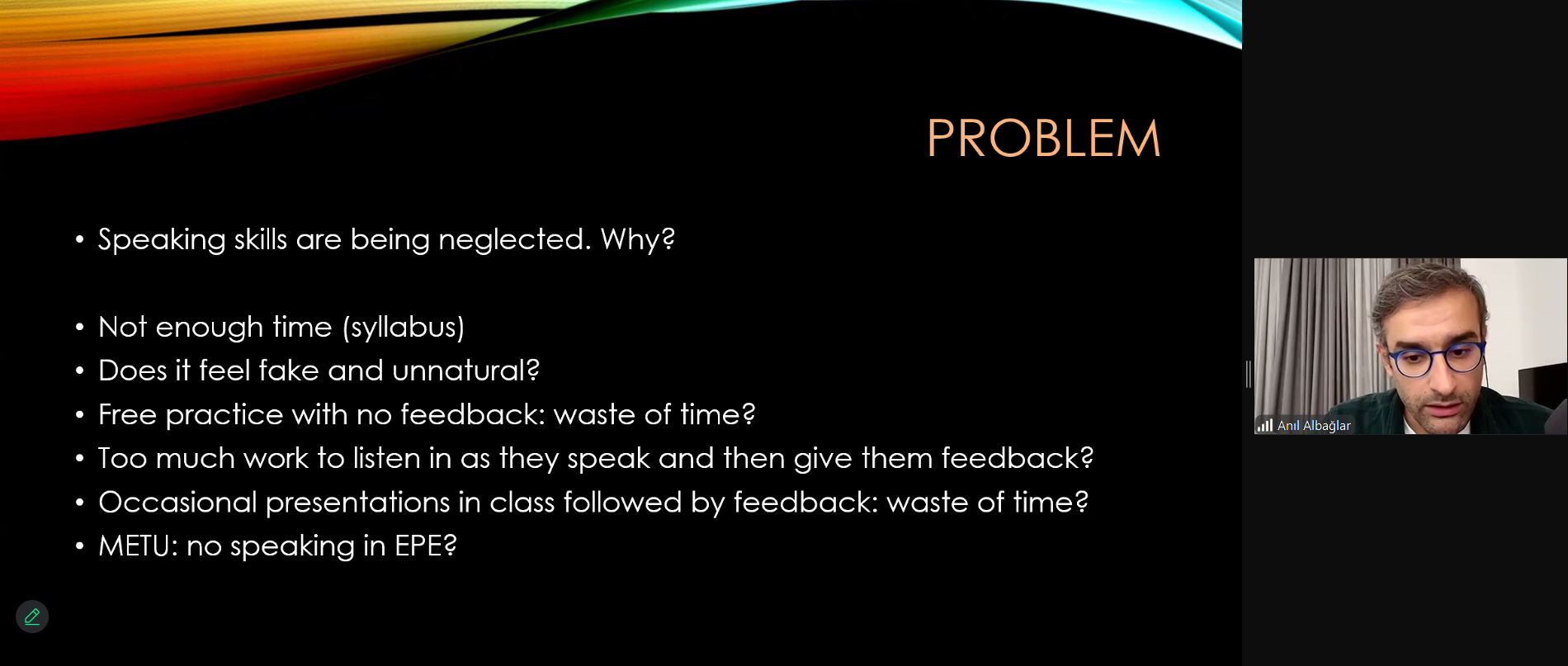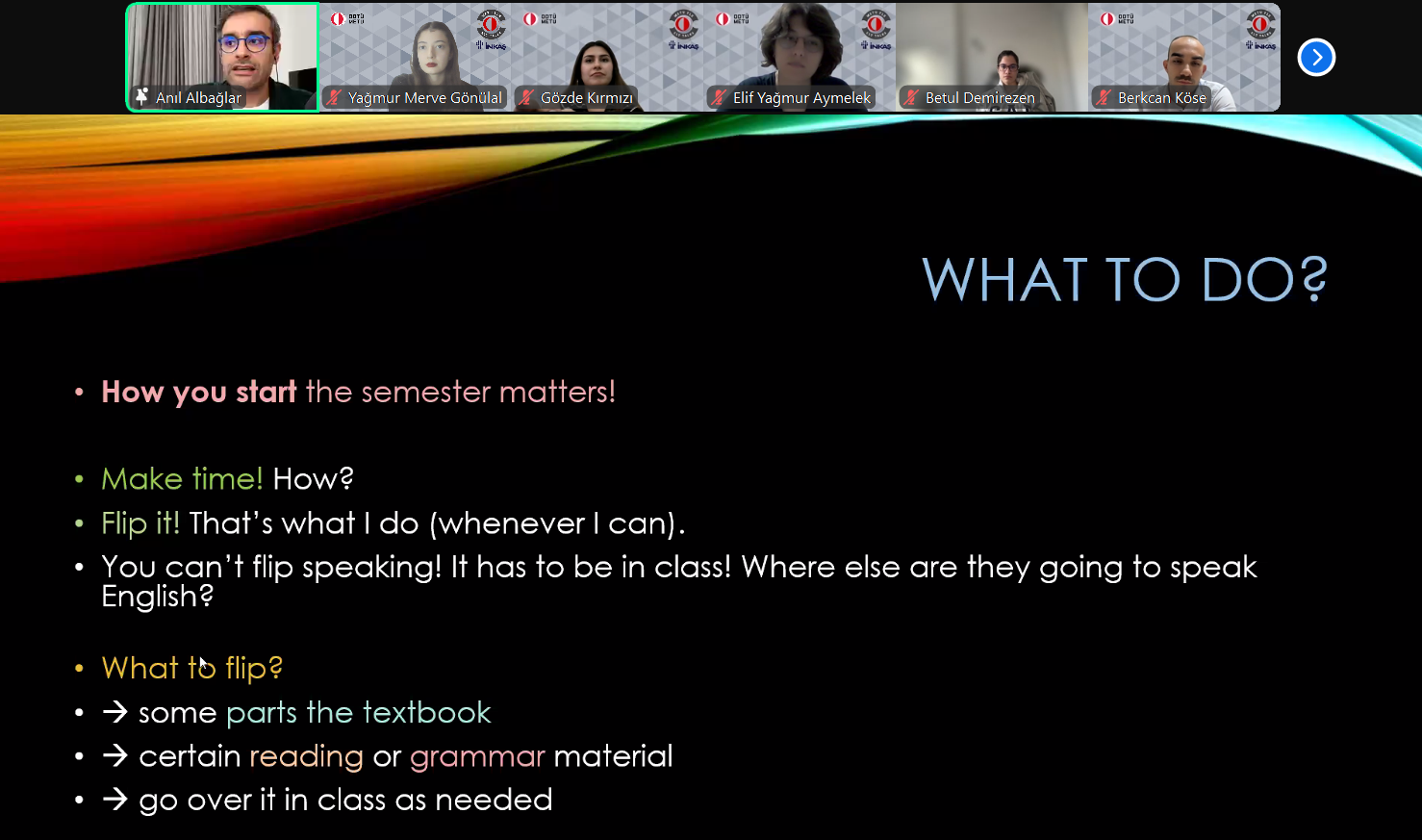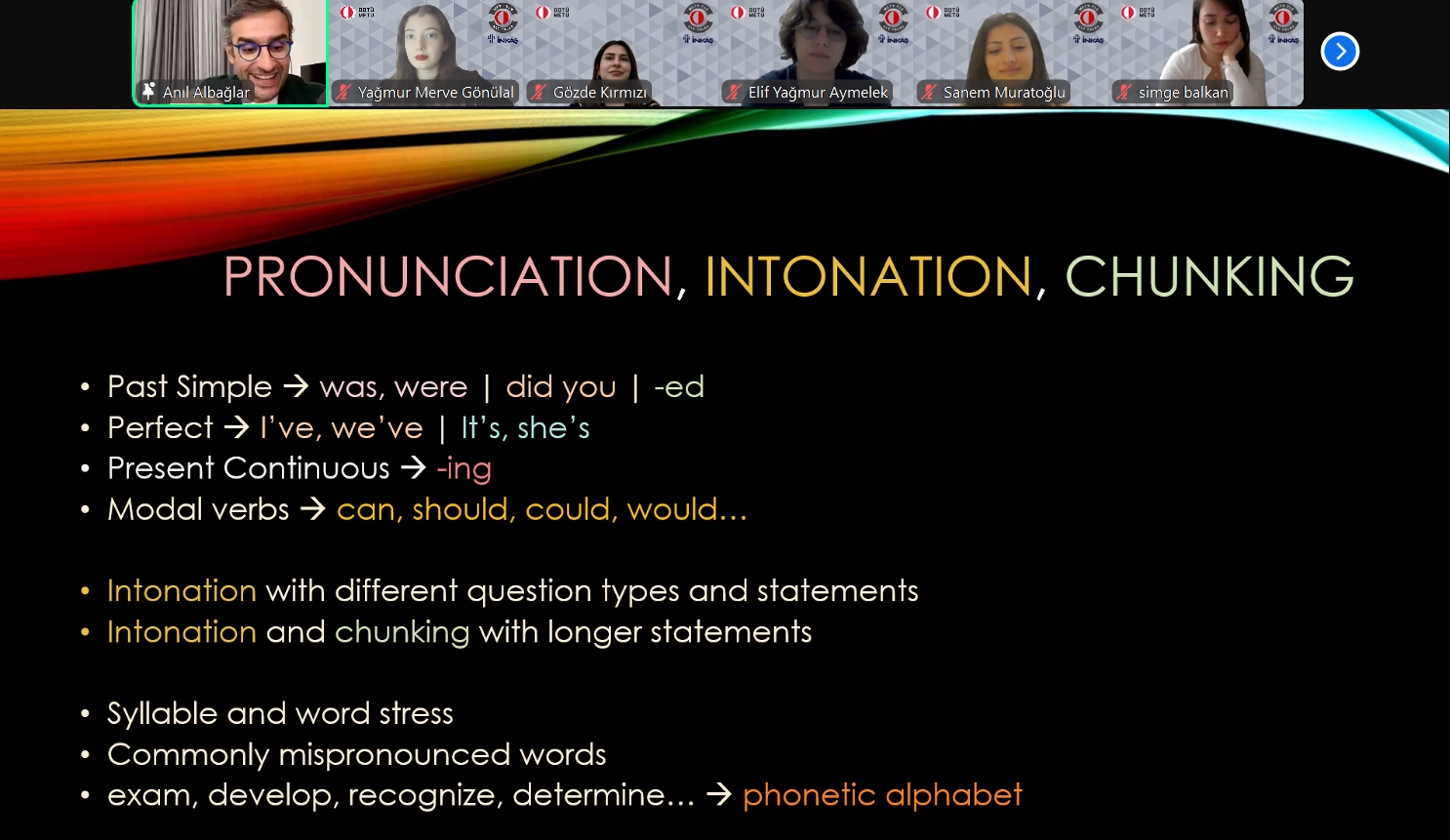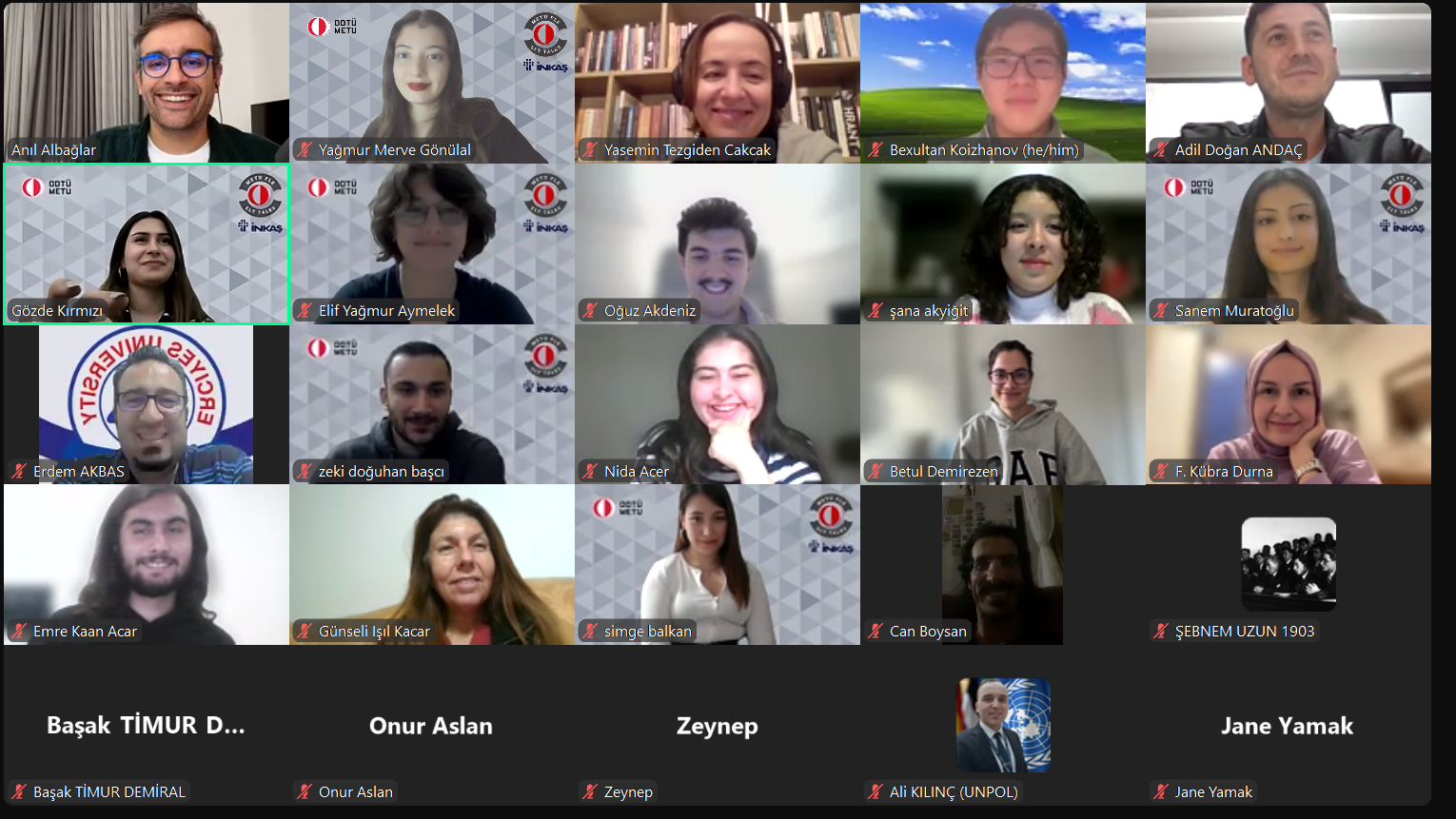METU FLE ELT Talks - Oturum 21 (Öğr. Gör. Anıl Albağlar)
Oturum notları:
"Speaking is one of the four primary skills in English, but it is, unfortunately, often the most underrated and undervalued. This undervaluation is primarily due to the time and resource constraints commonly faced in classrooms. Interestingly, many students and prospective English language teachers consider speaking the most challenging skill to improve. So, what can we do to address this issue? How can we effectively integrate speaking into our classes and tackle challenges such as limited time or shy learners?
For our 21st session, we had the pleasure of having Lect. Anıl Albağlar as our first lovely guest of the new semester. Albağlar shared highly valuable insights with us regarding integrating more activities regarding speaking, with a thought-provoking comment as his headline: "I thought we had four skills!" While we acknowledge four essential skills in language learning, including English, speaking is often overlooked, presenting a severe issue for learners and teachers. Albağlar began the session with an ice-breaker activity and later commented on its effectiveness:
"When you get together in the morning with your class, it is the first hour of the day. It is always a good idea to have some type of introduction activity like the one we had here, where you can make your students chat about a relevant topic and warm up a little. Let it be talking about the weekend or a recent event going on in the country. Make them speak and say hi to each other!"
While integrating speaking activities can present a fantastic opportunity, several issues are faced in the classrooms when it comes to speaking. As many teachers often point out, we have a syllabus to follow, which leaves us with limited time to cover all necessary materials. In addition, it might feel unnatural for students to engage in speaking further because it is perceived as an obligatory task. Furthermore, such speaking activities can be perceived as free practice sessions that do not provide any feedback. Also, it might be extra work for teachers to listen to students as they talk and provide feedback. Lastly, in the case of METU, there is no speaking component in the English Proficiency Exam (EPE), leading students to question the necessity of practicing their speaking skills.
So, what can be done? As in-service teachers and future educators, how can we strike a balance? Albağlar addresses this by emphasizing the significance of beginnings, especially in an academic setting. In other words, how you start the semester deeply matters!
"I think it is very important to set certain routines and habits at the very beginning of the semester. Because if you start doing things out of the blue after some time, it will feel odd. You must ensure that this change feels natural from early in the semester."
He also mentions how he "steals" time devoted to grammar and reading and allocates that time to speaking. He explains his logic by saying that although we can use flipped learning for specific reading and grammar activities, we cannot flip speaking! It has to happen in the classroom. Albağlar underlines this notion by saying, "As soon as your students leave your classroom, they will be speaking in their native language. So, where are they going to use the language? In the classroom!" Additionally, when it comes to how to use flipped learning, Albağlar mentioned that some parts of the textbook, as well as particular reading and grammar materials, even if it is not entirely flipped, can be partially flipped as homework, for instance. And if needed, the material given as homework can be covered in class.
Another essential aspect worth mentioning is authenticity. While we dedicate time to speaking, it should also be based on real-life contexts. Starting early in the semester is beneficial because it allows you to develop the language skills of your class. Also, after completing nearly every task, encouraging students to check their answers with their peers while you monitor their discussions can be highly useful. In addition, move them around, Albağlar says. "A student should not be someone who sits all the time; they will get sleepy. Have them get up and move around!" Creating meaningful and related scenarios is also another aspect to consider. "Although current textbooks are doing a great job and doing their best to make the students speak," as Albağlar says, "we can add a little twist, a bit more fun. It is not easy nor quick to prepare, but it can be quite worthwhile." A wonderful example Albağlar gave was for polite requests, such as ordering in a restaurant. Instead of using the menu, the textbook will provide, finding an authentic menu from a local restaurant in the city and using that with students will be more meaningful for them.
There are many paths to use for possibly shy and uninterested students when it comes to speaking. Albağlar suggested a method where students can take on the role of the teacher, even for just two minutes, to facilitate the answers for a fill-in-the-blank task, for example. This strategy not only provides a low-achieving student with a role in the class but also reduces the teacher's talking time and encourages peer interaction. Getting advantage of clubs can also be highly effective. It can be about a book you read, a movie you watched, or any other relevant topic. Albağlar also recommended incorporating debates and acting exercises. For instance, he shared an example where he assigned a script featuring Achilles and Hector and had the students practice the dialogue to perform in class. He noted, "If the teacher is willing to do things like acting in the classroom, even if it seems a bit silly, the students will wonder why they can't do the same."
Albağlar also emphasized the importance of being up-to-date with recent technological tools as they rapidly develop. From websites to chatbots, Albağlar says that as teachers, it is our responsibility to be updated and know which tools are the most effective ones. He also highlighted the importance of integrating pronunciation into the classrooms. "You can have the opportunity to show your students that it is not just about sounding like a native speaker but also about understanding native speakers. Studying pronunciation will help you with both your listening and speaking."
In a nutshell, despite possible constraints, especially faced in the state school conditions, as teachers, we remain hopeful and passionate about further enriching our classrooms with diverse activities, particularly for speaking. To conclude with a powerful quote from Albağlar,
"Learning about speaking, understanding native speakers, being exposed to authenticity, practicing pronunciation, intonation and learning more about chunking... All of this is the fun part of language learning. Do not deprive your students of that."
